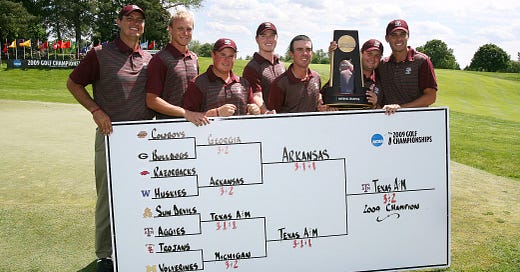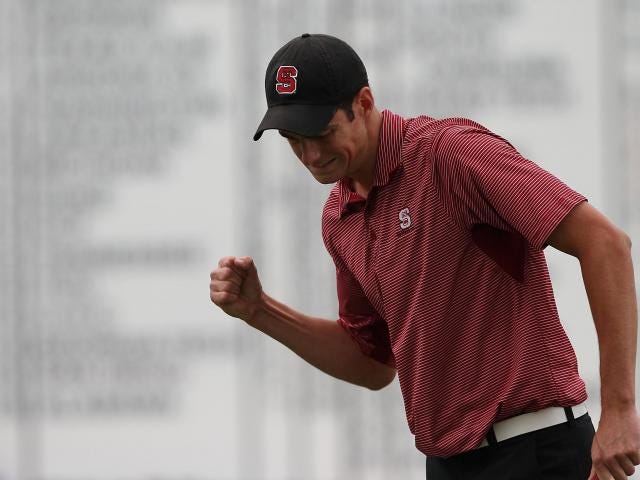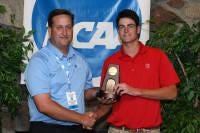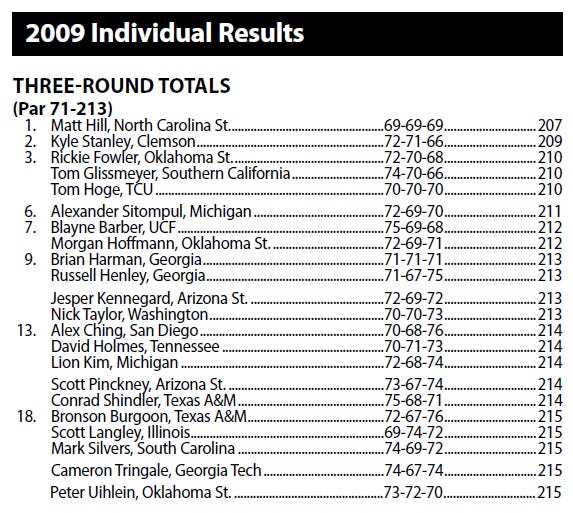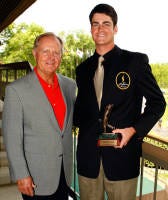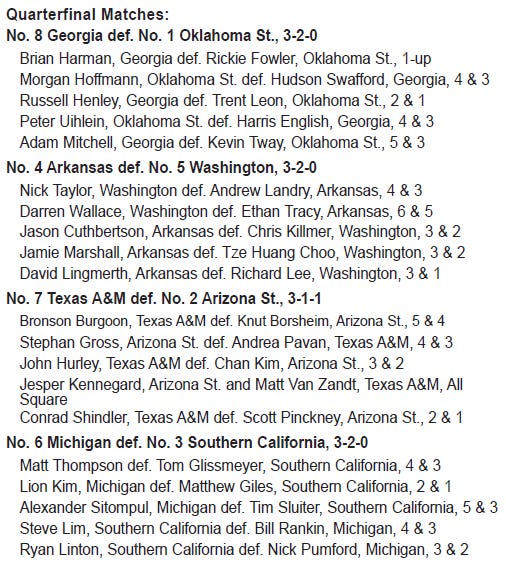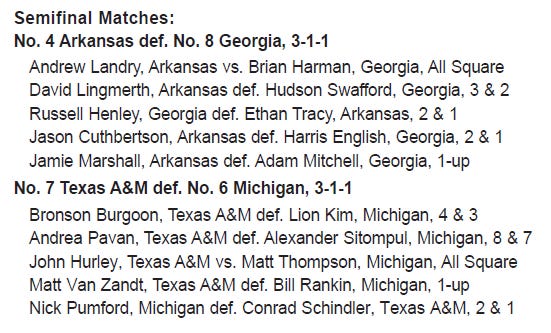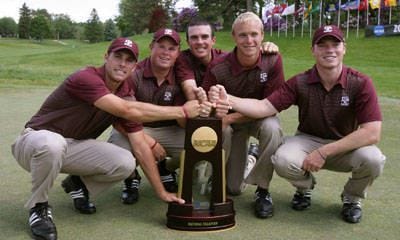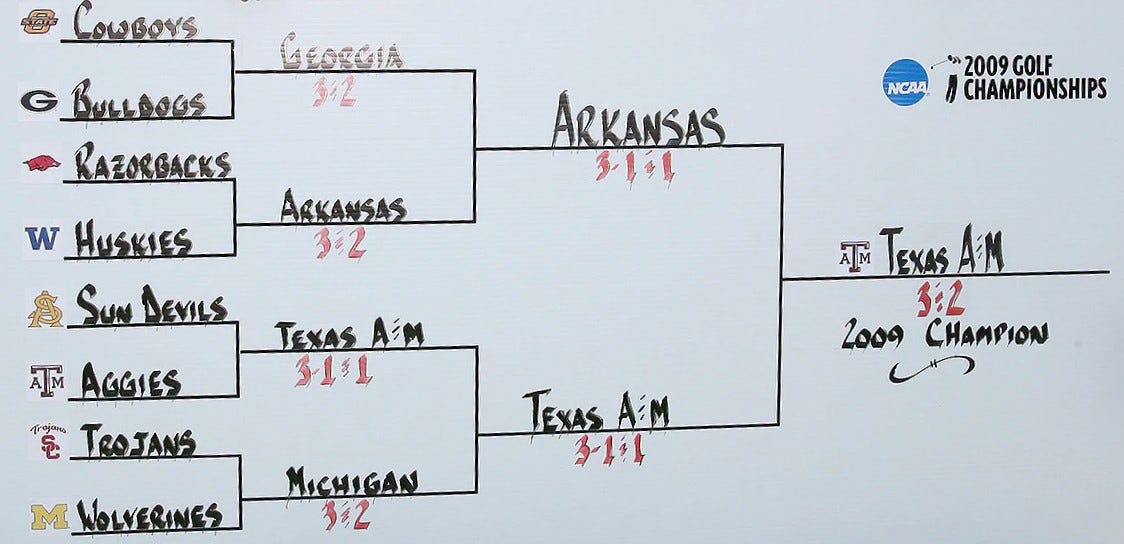This is part of a series on the Men’s Collegiate Championships
NCAA Championship Era: 1939-NOW
REGIONAL ROUND-UP
One of the major changes decided at the last NCAA Golf Committee meeting was to expand Regionals from 3 sites to 6. This allowed each site to host more teams and players (75 total including players from the 13-14 teams selected) while still only needing one “wave” of tee times. The top 5 teams and individual not of those teams.
Although various types of advertisements for the NCAA golf championship, (and even regionals) have appeared in newspapers and even online before, we’re now reaching the point the time where some of these are still preserved in publically accessibly places such as YouTube. Most of these are little more than infomercials, however there are some real gems. This series of This Is SportsCenter-inspired promos for the 2009 Regionals that Oklahoma State put together using star player Rickie Fowler encapsulates how far college golf has come in a way that words never could.
SOUTH CENTRAL REGIONAL (Oklahoma State)
Oklahoma State cruised to a team victory with the only sub-300 round on the final day. Coming down the stretch, LSU lost too many strokes to TCU and (surprise) Northwestern which put John Peterson in a tough position to qualify for the NCAA championship as an individual. Peterson ultimately lost the playoff to Cody Paladino [Baylor].
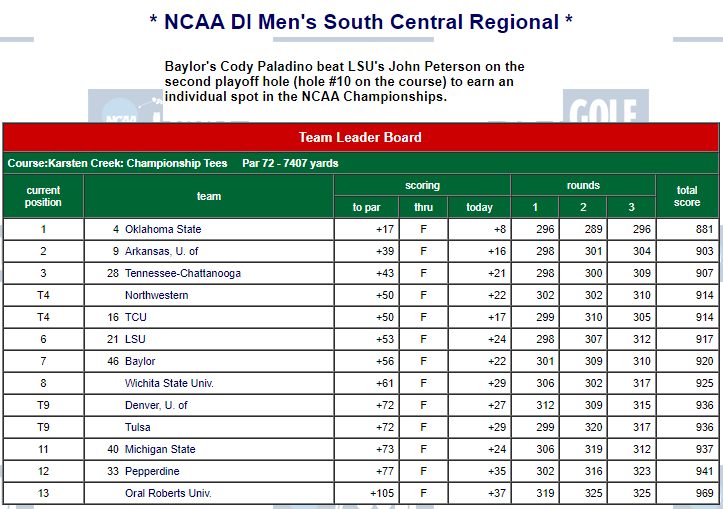
CENTRAL REGIONAL (Western Kentucky)
Washington got off to a hot start with a 10 stroke lead after the first round, but UCLA posted back-to-back low team scores in rounds 2 and 3 to take the team title. Ohio State was the surprise team to advance while Duke took the last spot just four strokes ahead of Louisville, Ole Miss, and NC State. Nick Taylor [Washington] slipped in the final round which allowed Matt Hill [NC State], one of the top players in the country and riding an incredible hot streak, to take medalist honors and advance to nationals without his team. What made Hill’s performance even more impressive was that he was still dealing with nagging strep throat.
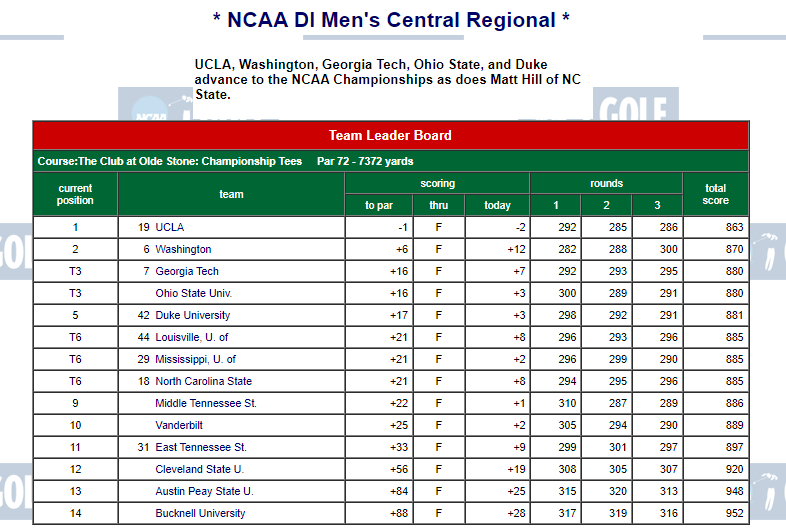
NORTHEAST REGIONAL (Columbia)
Clemson, one of the top teams in the country and expected to breeze through Regionals (as they had a history of doing), had to count TWO 81s in the first round and never really recovered. The second seeded Alabama team also struggled on the first day, but quickly righted the ship and was able to take the team championship thanks to medalist Hunter Hamrick - who posted a final round 67 to take the title by 1 stroke - and Bud Cauley who had a (counting score) 79 round 1 but battled back with a 67-71 to finish T3. The two other players who also finished T3 - Kyle Stanley [Clemson] and John Hahn [Kent State] - had a playoff for the individual berth into the championship, which Stanley won with a birdie on the second hole.
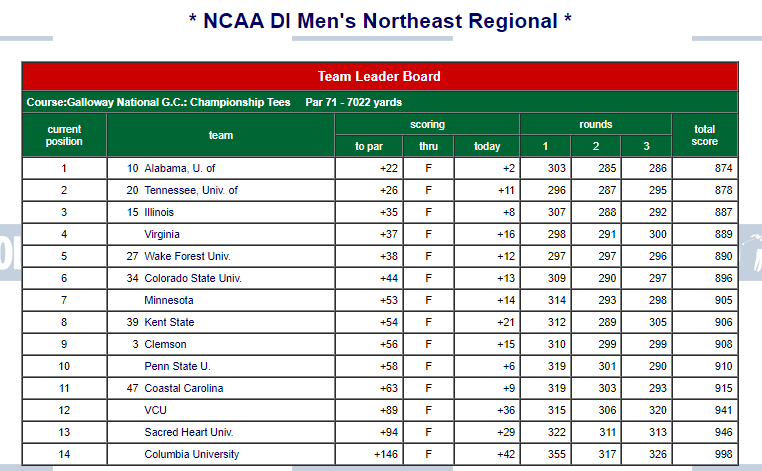
SOUTHEAST REGIONAL (Central Florida)
UCF made full use of home course advantage to beat out #1 team Georgia for the team title. Iowa held onto the final spot for their first trip to nationals since 1995 - only their second appearance since 1960. Tarquin MacManus [Arizona] posted his third round in the 60s - with a first round 63 - to beat out UCF teammates Brad Schneider and Blayne Barber for medalist honors.
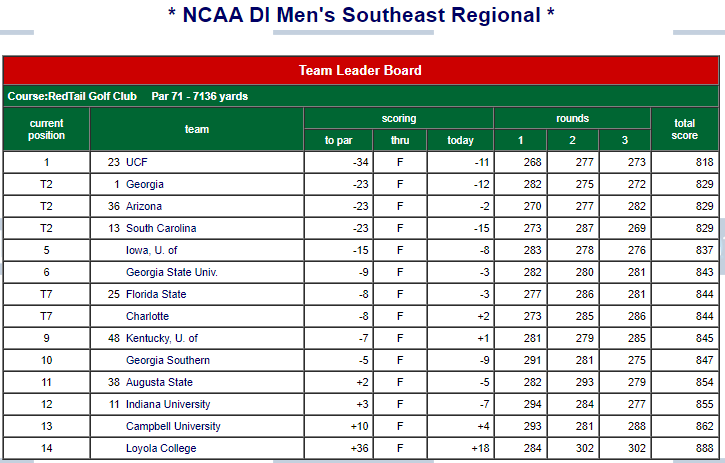
SOUTHWEST REGIONAL (Texas)
The biggest surprise here was that both UNLV and Lamar played their way out of the final spot while Michigan, shooting the best team score of the round, punched their ticket to nationals for the first time since 1997. Lance Lopez [Texas] remained the only player under par to win by 5 strokes over a charging Billy Horschel [Florida] who shot the only sub-70 round of the day.
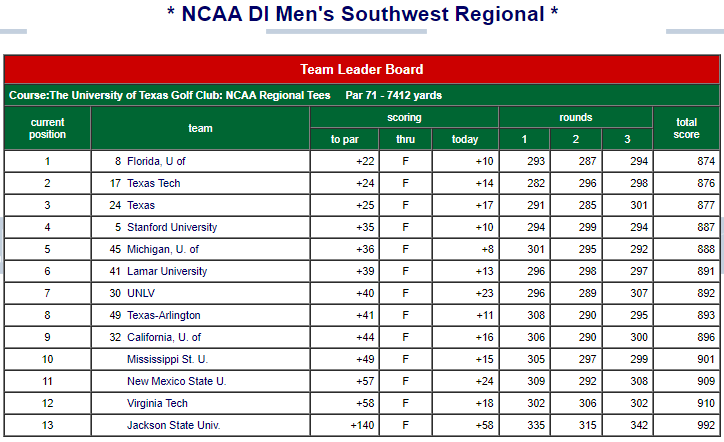
WEST REGIONAL (San Francisco)
USC, the number 1 seed in the regional, nearly failed to advance when 2007 NCAA champ Jamie Lovemark cracked a rib that eventually forced him to WD, leaving them to count all of their remaining scores. Although they were able to slide in just ahead of New Mexico, USC was without Lovemark for the championship. Arizona State won the team title thanks to medalist Jesper Kennegard who managed to outlast a hard charging Bronson Burgoon [Texas A&M] who shot a final round 64 but ultimately came just a single stroke short.
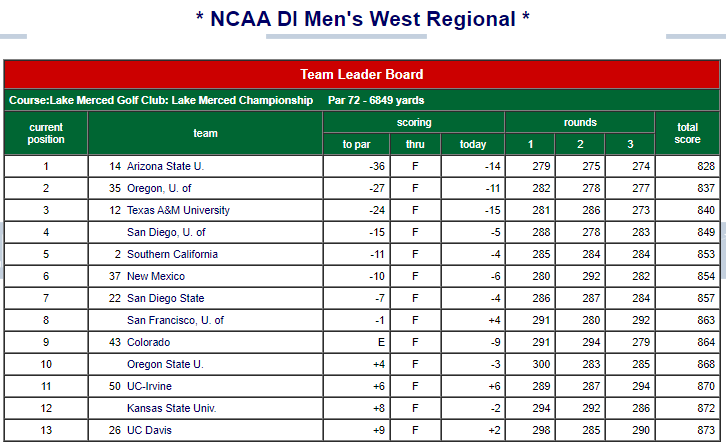
Intercollegiate Championship #112: May 26-30, 2009
Host: Inverness Club (Toledo)
The only previous time Inverness was host to the championship was 1944 when Notre Dame narrowly edged out the all Big Ten field of Minnesota, Michigan, Ohio State, and Michigan State.
Format
For the first time since the 1916 championship, team match play is back in use to (help) determine the team winner. In an attempt to combine the best of both stroke play and match play, the committee decided to use the former as a way to cut to the top 8 teams worthy of competing in the latter. Clearly this was done with potential TV audiences in mind as advocates had been arguing for years that the best way to grow the game was to broadcast (at least) the championship, but the fear has always been that the 5-count-4 format was just too difficult to both convey and digest in real time. Oklahoma State AD and committee chairman Mike Holder stated, “Match play has enjoyed tremendous success in the Ryder Cup and our committee hopes that spectators and television will enjoy the excitement generated by this form of scoring.” Once again, his words would prove to be prophetic, made even better by the fact that the NCAA had set up a live webcast showing holes 1, 2, 17, and 18 which would capture a historic moment.
Team and Individual stroke play
Day 1 (Tuesday) = 18 holes
Day 2 (Wednesday) = 18 holes
Day 3 (Thursday) = 18 holes
**54 holes determines Individual championship
**Cut to top 8 teams
Team match play
Day 4 (Friday) = 2 matches
Quarterfinals
Semifinals
Day 5 (Saturday) = Finals
Results
Individual Medalist/Champ: Matt Hill [NC State]
Darkness settled over Inverness on the second day while half of the field was still trying to complete their second round. A four and a half hour rain delay interrupted what had otherwise been a fairly nice championship, throwing a couple of wrinkles into the schedule. Two of the players tied atop the leaderboard through two rounds - Matt Hill [NC State] (69-69) and Russell Henley [Georgia] (71-67) - were able to return the course in time to complete their rounds, however San Diego freshman Alex Ching had to sleep on the notion of being tied for the lead as he and his teammates joined several other teams at the course around 6:30 the next morning to finish the round. Trying their best to get everyone through the 3rd round on time, tee times and starting holes were shifted around a bit to make sure that by the time darkness inevitably stopped play they would at least know who had won the individual title as well as the top 8 teams moving on to match play. Hill started on the 10th hole in a group with two other individuals playing without their teams - Kyle Stanley [Clemson] and Hugues Joannes [Lamar]. Hill made the turn at even par and made a nice birdie on hole #2 (his 11th) to gain some momentum before entering Inverness’ toughest stretch of holes. While he was playing steady golf, Hill had found himself down to TCU’s Tom Hoge - playing in the group ahead - until Hill made a clutch birdie on his 14th hole while Hoge made his second straight bogey. While Hoge faded, Hill made a nice two-putt birdie on the par 5 8th hole (his 17th) to offset his bogey on the previous hole, and open up a small cushion on his lead. Kyle Stanley, the runner-up in 2007 to Jamie Lovemark, made a final push on the closing two holes but came up just short again, having to settle for another 2nd place finish. From Ryan Herrington’s article on the tournament for Golf Digest:
"I knew I needed to make a couple of birdies down the stretch," Stanley said. "You've got to tip your hat to Matt. He played some incredible golf. He's used to winning and I think that showed in how he handled himself." Hill agreed that the success earlier this spring made any pressure of trying to claim the national championship a little less daunting.
"I definitely felt a lot more comfortable than I might have say a year ago," Hill said. "The past experience was a huge benefit." After a year in which he had done little else, Hill can profess to one simple truth. Winning never gets old.
EXTRA HOLES: Matt Hill’s Incredible Season
Winning any college tournament is special, but winning 8 in a single season - in 9 tournaments played - puts you in the history books. That’s exactly what Matt Hill did in the 2008-09 season, beating the previous ACC record of 5 individual wins in a single season. By the end of the season, Hill had risen to the 4th ranked amateur in the world. Here is a breakdown of his year:
Hyatt Regency (Sep 6-7) = 4th
Hartford Hawks Invitational (Sep 28-30) = Medalist
Bank of Tennessee Intercollegiate (Oct 24-26) = T14
Rice Intercollegiate (Feb 16-17) = T6
Puerto Rico Classic (Feb 27-Mar 1) = T12
General Hackler Invitational (Mar 8-9) = Medalist
Chris Schenkel E-Z-Go Invitational (Mar 20-22) = Medalist
Hootie at Bull’s Bay (Mar 29-31) = T5
River Landing Intercollegiate (Apr 10-11) = Medalist
ACC Championship (Apr 17-19) = Co-Medalist
Big Four (May 11) = Medalist
NCAA Regional (May 14-16) = Medalist
NCAA Championship (May 26-28) = Medalist
Matt Hill joined Tiger Woods (1995-96) in not only winning 8 tournaments in a single season, but also becoming the only other player to win his conference championship, regional, and the NCAA championship all in the same year. Also just like Tiger, Hill won Arnold Palmer Award, Jack Nicklaus Award, and Haskins Award for his incredible accomplishments. Although his pro career would not be as successful as Tiger’s (which is just an unfair comparison), Matt Hill will forever be linked with Tiger in the annals of college golf.
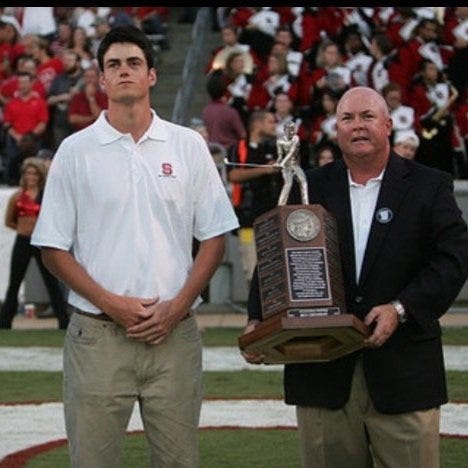
Oklahoma State tied for the best team score in the first round and then followed that up with the second best scores in both rounds 2 and 3 to run away with the stroke play lead. Since the end of WWI - that’s one ‘i’ not two - stroke play had decided the team championship, but instead of celebrating a second title in 4 years, Coach Mike McGraw’s Cowboys were getting prepared for the first and perhaps most historic NCAA team match ever, scheduled for the next morning. McGraw’s attitude perhaps wasn’t what most would expect. When asked about the situation he responded, “We knew that would be the case whether we finished first, second or eighth. You just want to build confidence every day because that's the battle you have in golf. Finishing first gives us a lot of confidence because you always want to play well and feel good. We're going to have seven great teams left and you're going to have to play someone good.” One of those teams was USC, who was T22 after the first round, but made one final push in the third round, moving up nine spots to go from outside the match play cutline to T3. Texas A&M and Georgia tried to play their way out of making match play, however they managed to hold fast to the final spots ahead of TCU and Georgia Tech. Because of the rain delay on Wednesday that pushed half of the field to finish their second round on Thursday morning, there were still six teams - all of which were well outside of the cut line - who had to come back Friday morning to finish their 3rd round of stroke play.
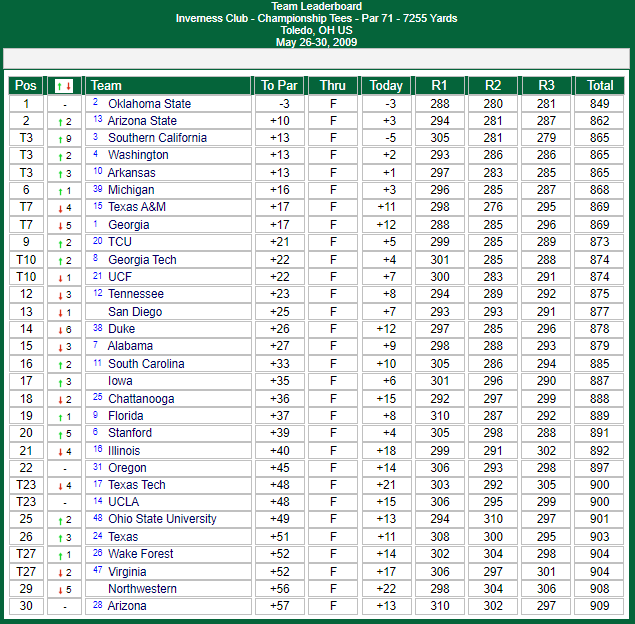
(via GolfStat)
Team Match Play:
There’s entirely too much to say about these Quarterfinals and specifically the historical significance of the Oklahoma State/Georgia matchup, so we would highly recommend you read this article written by Ryan Lavner for Golfchannel.com in 2019. The high points are these:
Oklahoma State and Georgia were ranked 1 and 2 all year and thought to be destined to meet in the Finals
Georgia let off the gas entirely in the final stroke play round, dropping from T1 with Oklahoma State all the way down to the cutline for match play
Georgia actually should have been the #7 seed (to play #2 Arizona State), but Hudson Swafford accidently signed for a score one stroke higher than he shot, meaning his counting score dropped them into a tie for the final two spots
Georgia lost the tie-breaker (total of all drop scores for each team) with Texas A&M, making them the #8 seed and set to face the team they were tied with just 24 hours prior in a 5-player single-elimination match to decide who would advance to the Semifinals
The Oklahoma State/Georgia match lived up to the hype and would have been a fitting Finals title fight had things worked out that way, coming down to the anchor match between two of the best players in the country - Rickie Fowler and Brian Harman
In the end, Harman got the better of Fowler after flipping the match late, and Georgia moved on to an afternoon Semifinals match with hardly any time to process the incredible victory
Clearly match play was proving to be as exciting as hoped/expected by those pulling for it. Even in defeat, Coach McGraw had this to say: “The format is unbelievable and those coaches who say this is not the right format need to be here on a day like today. That was a great match-up.” He added, “This is a wonderful format. It has nothing to do with whether we won or lost today.”
Meanwhile, the other matches provided their own excitement
Arkansas, who overcame a high first round in stroke play to get into a tie with USC and Washington, was matched up against the latter in the Quarterfinals due to the former winning the tie-breaker (scoring the best of the three in the final round). The match was close, decided on the 17th green when Lingmerth [Arkansas] birdied to Lee’s double bogey, sending Coach Matt Thurmond’s Huskeys home and Coach Brad McMakin’s Razorbacks on to the Semifinals against Georgia.
Texas A&M made use of their opportunity and took down Arizona State with one match (Kinnegard/Van Zandt) still tied on the course, which was officially logged as a tie, awarding a half point to both teams. It was an incredible let-down for Arizona State - lead by Coach Randy Lein who was inducted into the GCAA Hall of Fame that year - who again finished ranked in the top 10.
USC was clearly missing Jamie Lovemark, but had battled back to make match play and score a high seed. Trojan’s Coach Chris Zambri - who was the Dave Williams Coach of the Year in 2008 and would later join the Pepperdine team as a volunteer assistant coach ahead of their 2021 championship - couldn’t keep the magic going and Michigan, who Coach Andrew Sapp had on quite a run of their own, continued to defy expectations.
The hangover from Georgia’s morning victory hit them hard in the afternoon. Make no mistake, Arkansas earned the match win and the subsequent berth into the Finals the following morning, but it very likely might have been a different story if the match had been held on its own day. Harris English likened it playing back-to-back March Madness games in one of several quotes in Lavner’s article that showed just how (understandably) unfocused the Georgia team was for the Semifinal match. Georgia Coach Chris Haack said it best, “I think it took a little bit out of us. I almost wish we had a night to sleep on that one but that's the way it goes. Arkansas played great. Those guys made a lot of birdies. I told my players we might not have gotten the trophy but we won a national championship match. That was a match we had to win. When they talk about this tournament, that was the match.” Arkansas Coach McMakin stated, “We feel great and the kids did a great job. We played a great team in Georgia and they're the best team in the country. We're just fortunate to come away with a win. Anything can happen in match play and we just caught fire the last couple of days and hopefully it can continue tomorrow.”
Texas A&M Coach JT Higgins was well aware just how special of a position his team was in, urging the guys to close out matches as fast as they could since the possible comeback was always a lurking threat: “It's so fantastic. Michigan was unbelievable and they wouldn't go away. We had a chance to close them out several times and they kept fighting and fighting. I was so impressed with their team and they were amazing. We kept trying to answer their punches by throwing a counterpunch. We kept coming at them. It was a great match all the way around.” Michigan’s Coach Sapp added, “The guys played great. Obviously it's disappointing to lose such a close match but I couldn't be more proud of the guys. They battled to the last hole. They played their hearts out. I'm so proud of them. We were the Cinderallas but I guess the clock struck midnight.” Commenting on the match play aspect he also added, “It's really exciting pitting team against team. There's no better format for a team championship. It brings a new level of intensity to the golf because every putt counts so much more.”
Finals: Texas A&M (1 NCAA, 1 overall)
Once again, there’s way more to the story and a good bit of it has been captured in more detail in articles such as this one as well as this one. Even though the championship match featured teams and players that many were not expecting, the outcome was a thrilling as hoped. Each team took two of the first four matches, meaning the championship hinged on the final pairing of number one players - Bronson Burgoon for Texas A&M and Andrew Landry for Arkansas. Entering the 18th hole all square, Landry placed his tee ball in the fairway while Burgoon - who had seen his 3 hole advantage vanish in the last couple of holes - found the right rough a bit closer to the green. Landry played first, coming up a bit short and leaving a long birdie putt. Walking with Burgoon was assistant coach Jonathan Dismuke (just a few months later would become the head coach at Houston) who did his best to focus his player by telling him exactly where to place it on the green. Burgoon hit his shot perfectly, landing 20 feet to the right of the pin and catching the slope that fed right to the hole. The crowd and NCAA live stream announcers went wild as Burgoon’s ball nearly went in, stopping less than a foot from the hole and leaving a kick in birdie. When Landry’s ~35 foot birdie putt to extend the match failed to drop, Texas A&M had their first ever golf championship and first men’s title of any kind since before WWII. Living the moment that all players hope for, Burgoon stated, “This was better than any dream I ever had in my life.” Even without the Georgia/Oklahoma State match the day before, this shot, caught on camera streaming the drama to viewers not at the course, all but guaranteed that team match play was here to stay.
COACHES CORNER: Richard Sykes [NC State]
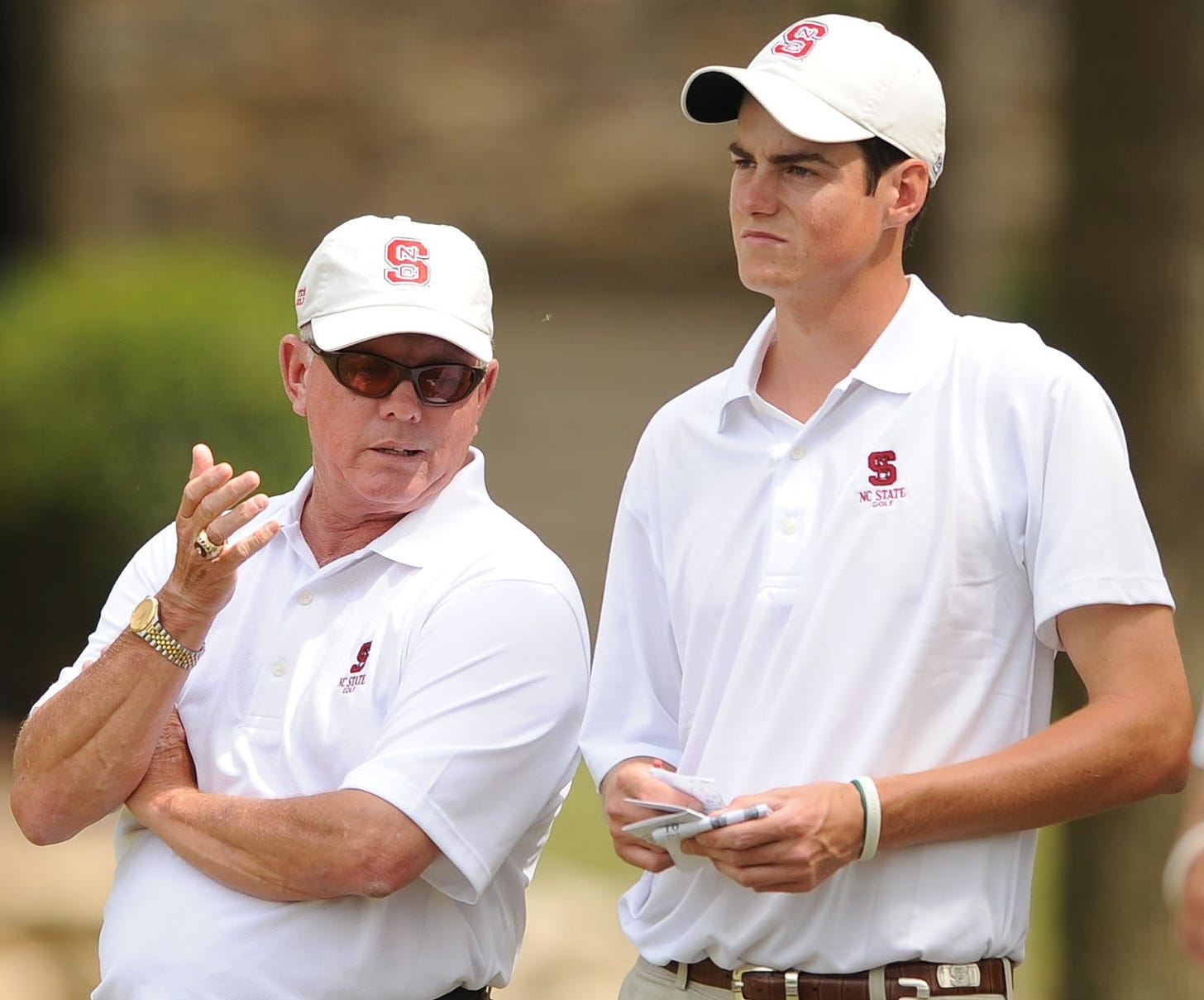
Matt Hill was Coach Richard Sikes’s only individual NCAA champ, but he was far from the only player to proudly represent the NC State Wolfpack logo on the national stage. Over the course of a 46-year Hall of Fame career, Sykes coached 34 All-Americans, 47 All-ACC players, 6 ACC champions, 3 ACC Rookies of the Year, and 2 ACC Players of the Year. Sykes was also named the ACC Coach of the Year 5 times and inducted into the GCAA Hall of Fame in 2001. One of the longest coaching careers in college golf history started in 1972 when Al Michaels - who was Sykes’s own coach just three years prior - moved over to coaching the NC State football team, leaving a vacant position that Sykes was pushed into filling. What Sykes thought to be a temporary coaching career eventually stretched into a fifth decade before he ultimately decided to retire following the 2017 season at the “even par” age of 72. When it was all said and done, Coach Sykes had overseen 52 team tournament titles (including the 1990 ACC championship), 23 NCAA Regional appearances, and 12 NCAA Championship berths. Beyond just his impact as a coach and mentor to countless players, Coach Sykes’s lasting legacy includes assisting with the completion of NC State’s Lonnie Poole Golf Course, which opened in 2008.
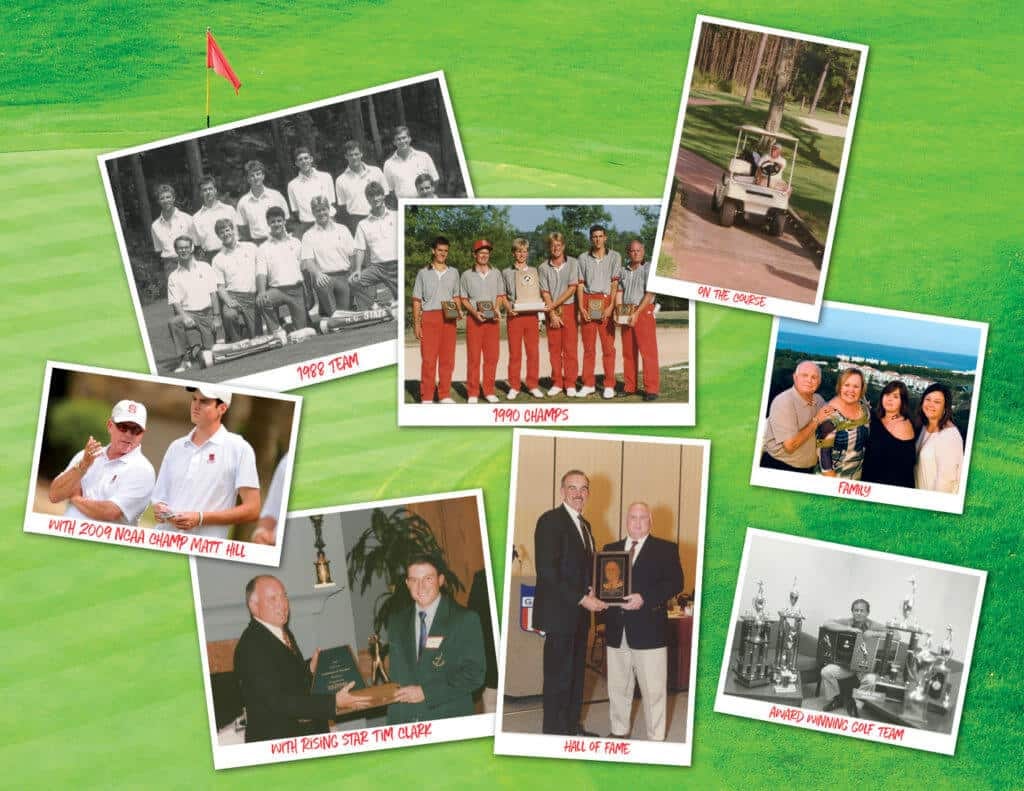
Thanks for reading!
Up Next:
In the next post we will cover the 2014 championship where Alabama capped off an incredible three (but really four) year run with their second straight team title. Roll Tide!

